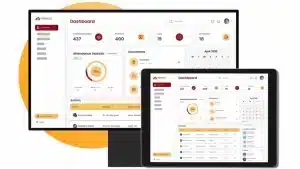Imagine managing a payroll process where every detail matters—ensuring accurate salaries, calculating taxes, and complying with complex regulations. For Philippine businesses, payroll Philippines is not just a routine task; it’s a cornerstone of operational success and employee satisfaction.
However, payroll management in the Philippines comes with unique challenges, from navigating varying regional wage rates to accurately computing mandatory contributions for SSS, PhilHealth, and PAG-IBIG. Many HR managers also struggle to keep up with ever-changing labour laws and ensure timely tax compliance.
In a Kittelson & Carpo Consulting report, compliance with Philippine payroll regulations is cited as one of the top five concerns for local businesses, mainly due to the complexity of tax and contribution computations. This highlights the need for companies to adopt efficient payroll systems that can automate calculations and ensure compliance with ever-changing regulations, reducing the administrative burden and risk of errors.
In this article, we’ll break down the intricacies of payroll management in the Philippines and introduce solutions like HashMicro Payroll Software that can simplify the entire process. Stay tuned to learn how you can transform payroll challenges into seamless operations.
Table of Contents

Key Takeaways
|
What is Payroll and Who is Responsible for It?
Payroll is the systematic process of compensating employees for their work ensuring they receive their rightful earnings. It includes essential tasks such as calculating salaries, applying tax deductions, and contributing to mandatory government benefits like SSS, PhilHealth, and Pag-IBIG in the Philippines.
For businesses, this process is not just about paying employees—it’s also about maintaining compliance with local labor laws and tax regulations. Depending on the size and organizational structure, payroll is usually the responsibility of a company’s finance or human resources department.
Larger businesses may have dedicated payroll teams within the finance department to handle computations, while HR ensures the accuracy of employee records and attendance data. On the other hand, smaller businesses often rely on a single department or individual to manage employee data and salary processing.
Many companies in the Philippines adopt a payroll management system or outsource to third-party providers to ensure accuracy and efficiency. These tools simplify tasks like generating a payroll format or creating a sample payroll, ensuring timely salary payments.
Philippine Payroll Regulations
 The Labor Code governs Philippine payroll regulations, requiring employers to adhere to specific wage rules, benefits, and deductions. Essential requirements include the mandatory 13th-month pay, timely salary payments, and contributions to SSS, PhilHealth, and Pag-IBIG, ensuring compliance and employee welfare.
The Labor Code governs Philippine payroll regulations, requiring employers to adhere to specific wage rules, benefits, and deductions. Essential requirements include the mandatory 13th-month pay, timely salary payments, and contributions to SSS, PhilHealth, and Pag-IBIG, ensuring compliance and employee welfare.
Employers must accurately calculate deductions, such as withholding taxes, following the Bureau of Internal Revenue (BIR) guidelines. To simplify this, businesses can use tools like a payroll system or refer to a sample payroll in the Philippines to ensure accuracy and efficiency.
Maintaining proper documentation, such as payslips and tax contribution records, is essential to demonstrate compliance with these laws. By using organized payroll formats and automated systems, businesses can streamline processes while fostering employee trust and accountability.
Important Components of Salary in the Philippines

To correctly manage payroll in the Philippines, businesses must ensure compliance with labor laws and provide employees with their rightful benefits. Payroll components in the Philippines are designed to adhere to legal standards and promote employee well-being and financial security.
Below are the vital elements of payroll that every employer should be aware of:
1. Cost of Living Allowance (COLA)
COLA is a mandatory benefit for minimum wage earners to help offset the cost of daily necessities. It is automatically added to the base salary of qualified employees, ensuring fair support for their living expenses.
2. Overtime pay
Employees working beyond 8 hours are entitled to overtime pay at 125% of their regular hourly wage. For overtime on holidays or rest days, the rate increases to 130%, demonstrating the importance of fair compensation for extra work.
3. Holiday pay
Employees are entitled to 100% of their daily wage as holiday pay even if they do not work on a declared holiday. If they work on a holiday, they are compensated with another day’s pay, ensuring equitable treatment and compliance with labor laws.
4. 13th month pay
A hallmark of Philippine labor law, the 13th-month pay is equivalent to one-twelfth of an employee’s annual basic salary. It is distributed before December 24 to provide financial relief during the holiday season.
5. Non-taxable benefits
Certain perks, like uniform allowances (up to PHP 5,000 annually) and unused leave credits converted to cash, are non-taxable. These benefits give employees added value without increasing their tax burden.
6. Income tax
Income tax is calculated based on taxable income, with rates ranging from 0% for annual incomes up to PHP 250,000 to 35% for those earning more than PHP 8 million. Employers are responsible for deducting and remitting the appropriate tax amounts.
7. SSS, PhilHealth, and PAG-IBIG contributions
Employers and employees share contributions to SSS, PhilHealth, and PAG-IBIG, ensuring access to retirement, healthcare, and housing benefits. For example, PhilHealth contributions are set at 4% of monthly salary, equally split between the employer and employee.
By understanding these payroll components, businesses can build a system that complies with legal standards and fosters a supportive and fair workplace for their employees.

Aspects of Work Structure and Payroll
Some aspects of the Philippine work structure directly affect payroll. If you’re setting up payroll here, consider the following:
1. Probation Period
Employees often start with a 6-month probationary period, during which their performance is evaluated. Probationary workers may not receive certain benefits, like rice or transport allowances. If their contract isn’t renewed, payroll must include termination and severance pay.
2. Working Hours
The standard workweek is 40 hours over five days. Overtime begins after 8 hours daily and must be paid as follows:
- Regular days: Hourly rate × 125%
- Holidays/rest days: Hourly holiday rate × 130%
3. Holidays
The Philippines observes several regular and special holidays. Employees working on regular holidays must be paid 200% of their daily rate. Payroll must also account for these mandatory holiday payments.
4. Termination and Severance
Regular employees cannot be terminated without just cause, as defined by the Labor Code. Severance pay applies in cases like redundancy, calculated as:
- 1 month’s salary OR
- 1 month’s salary per year of service, whichever is higher.
5. Payroll Schedule
Employers must pay workers at least twice a month, with payment intervals not exceeding 16 days. Weekly payments are allowed, but paying employees only once a month is prohibited.
Keeping these points in mind will help ensure your payroll system complies with Philippine laws.
How is Payroll Calculated in the Philippines?

Payroll calculation in the Philippines follows a straightforward formula:
Gross Pay – Deductions = Net Pay
However, while the formula appears simple, each component—gross pay and deductions—has multiple elements that must be carefully accounted for.
Gross pay comprises the base salary, allowances, overtime pay, and other earnings. Accurate computation of gross pay is crucial to ensure correct deductions. Meanwhile, net pay is the remaining amount after all deductions, which is what employees receive as their take-home pay.
1. Calculating Gross Pay
Gross pay is calculated by adding the following components:
- Basic Salary
- Overtime Pay
- Holiday Pay
- Night Shift Differential
- Bonuses and Incentives
2. Determining Net Pay
To calculate net pay, subtract these deductions from gross pay:
- Withholding Tax
- SSS Contributions
- PhilHealth Contributions
- Pag-IBIG Contributions
- Other authorized deductions
Employers are legally required to calculate, withhold, and remit these deductions to the appropriate government agencies to remain compliant with Philippine labor laws.
The best payroll system is critical for ensuring accuracy, especially when dealing with complex payroll scenarios. By understanding and following this structured payroll format, businesses can meet legal obligations and build trust with their employees through transparent payroll practices.
Common Challenges of Payroll in the Philippines
Managing payroll in the Philippines comes with unique complexities due to strict labor laws and varying tax regulations. Businesses must address these challenges effectively to ensure compliance and avoid penalties.
1. Compliance Management
Navigating complex tax laws makes payroll management a daunting task, with non-compliance leading to hefty penalties. To address this, companies must build a process aligned with regulations or hire experienced payroll providers to ensure accuracy and timeliness.
2. Time-Consuming Processes
Manual payroll tasks like compiling data and calculating salaries consume valuable time that could be used strategically. Automating payroll with cloud-based solutions simplifies these tasks, freeing up resources for more productive activities.
3. Security Concerns
Handling payroll manually increases the risk of data breaches and fraud, such as ghost employees or false wages. Implementing secure cloud software with periodic audits can safeguard sensitive information and prevent misuse.
4. Multiple Input Sources
Using disconnected systems for employee records, leave, and benefits creates inefficiencies and duplication. Investing in integrated payroll software streamlines these processes, saving time and boosting organizational efficiency.
5. Burden on Payroll Teams
Repetitive tasks in manual systems overwhelm payroll teams, lowering morale and increasing errors. Automating payroll workflows not only reduces mistakes but also enhances overall productivity and job satisfaction.
Philippine Payroll Management Workflow
 Managing payroll in the Philippines involves a structured and methodical workflow to ensure accuracy, compliance, and efficiency. This process integrates essential steps such as employee record management, salary computation, tax and contribution deductions, and timely disbursement.
Managing payroll in the Philippines involves a structured and methodical workflow to ensure accuracy, compliance, and efficiency. This process integrates essential steps such as employee record management, salary computation, tax and contribution deductions, and timely disbursement.
By implementing a streamlined payroll system, businesses can minimize errors and foster trust among employees while complying with Philippine labor laws.
Below are critical steps in the Philippine Payroll Management workflow:
- Employee data collection and maintenance: Ensuring accurate employee records is the foundation of a seamless payroll process. Updating this data, from personal details to compensation packages, ensures accurate salary computations and compliance with legal requirements.
- Tracking work hours and attendance: Monitoring work hours, overtime, and leave days is crucial for fair and accurate payroll calculations. Leveraging timekeeping systems reduces manual errors and ensures the efficiency of payroll preparation.
- Gross salary calculation: Calculating gross salary involves summing up an employee’s basic pay, allowances, overtime, and other compensations. This step must also account for special components like holiday pay and the Cost of Living Allowance (COLA) to meet all obligations.
- Deductions for taxes and contributions: Employers are responsible for deducting contributions for SSS, PhilHealth, PAG-IBIG, and income tax from the gross salary. These deductions must be precise and remitted to government agencies on time to avoid penalties and ensure compliance.
- Net salary computation: Net salary is determined by subtracting all mandatory deductions from the gross salary. Transparency in this step is vital, as it allows employees to understand their earnings and builds trust in the payroll process.
- Payslip generation and disbursement: Providing employees with detailed payslips that outline gross pay, deductions, and net pay enhances payroll transparency. Timely salary disbursement through preferred methods like bank transfers ensures employee satisfaction and financial stability.
- Compliance and reporting: To maintain compliance, employers must strictly adhere to Philippine labor laws and tax regulations. Regular audits and on-time submission of reports to government agencies demonstrate professionalism and safeguard the company from legal issues.
This systematic payroll workflow ensures compliance and fosters employee trust and satisfaction, making it an essential process for any business in the Philippines.
How to Set Up Payroll in the Philippines
 Setting up payroll in the Philippines involves meticulous planning, legal compliance, and structured processes. Employers must adhere to Philippine Employment Laws, the Tax Reform for Acceleration and Inclusion (TRAIN) Act, and specific requirements from agencies like the Bureau of Internal Revenue (BIR), Social Security System (SSS), PhilHealth, and PAG-IBIG.
Setting up payroll in the Philippines involves meticulous planning, legal compliance, and structured processes. Employers must adhere to Philippine Employment Laws, the Tax Reform for Acceleration and Inclusion (TRAIN) Act, and specific requirements from agencies like the Bureau of Internal Revenue (BIR), Social Security System (SSS), PhilHealth, and PAG-IBIG.
1. Payroll Options in the Philippines
Companies in the Philippines can manage payroll in several ways, depending on their size, resources, and needs:
- In-house payroll management: Companies may choose to manage payroll processing internally. This means hiring dedicated personnel or a team to handle payroll calculations, tax filings, and employee disbursements.
- Outsourcing to a local payroll provider: Some businesses prefer to outsource payroll processing to a local service provider that specializes in managing payroll. These third-party providers ensure compliance with local laws and regulations.
- Using payroll software solutions: With advances in technology, many companies opt for automated payroll software to streamline payroll processing. These software solutions can calculate taxes, deductions, and payments efficiently, reducing the chance of errors.
2. Steps to set up payroll in the Philippines
Below are several steps to set up payroll for your company:
- Register with the Bureau of Internal Revenue (BIR): Begin by obtaining an Employer Identification Number (EIN) from the BIR. This registration is mandatory to legally employ staff and process payroll taxes in compliance with Philippine law.
- Establish payroll policies and compensation structure: Develop clear payroll policies and a fair compensation structure that complies with Philippine labor laws. These policies should address salary components, allowances, overtime pay, and deductions to ensure consistency and transparency.
- Collect employee data: Gather all necessary documents, such as government forms from BIR, PhilHealth, SSS, and PAG-IBIG, to set up each employee’s payroll profile. Ensuring complete and accurate records from the start minimizes errors and facilitates smooth payroll processing.
- Process payroll calculations: Using timesheets or attendance records, compute gross pay, deductions, and net pay accurately. Employing a reliable payroll system can automate this step, saving time and reducing human errors.
- Disbursements to employees: Once payroll is calculated, ensure employees are paid promptly through their preferred payment method, such as bank transfers. Timely payments are vital for maintaining employee morale and trust in the organization.
- Maintain proper documentation and records: Keep detailed records of all payroll transactions, including payslips, tax filings, and government contributions. These records are essential for audits, legal compliance, and resolving employee queries.
- Ensure data privacy compliance: In handling employee information, adhere to the Data Privacy Act of 2012 to safeguard sensitive data. Implement secure systems and protocols to protect employee records and prevent unauthorized access.
By following these steps, businesses can establish a robust and legally compliant payroll system in the Philippines. This ensures smooth operations and reflects the company’s commitment to professionalism and employee welfare.
Streamlining Payroll Management with HashMicro’s Payroll Software

HashMicro Payroll Software is fully integrated with BIR CAS and EIS, ensuring seamless compliance with Philippine tax regulations and reporting standards. This makes it the perfect solution for automating payroll processes while complying with government requirements.
Discover how HashMicro can revolutionize payroll management with its cutting-edge features and seamless functionality. By signing up for a free demo, you can explore the software’s capabilities and see how it aligns with your business needs.
Why We Recommend It: Payroll management in the Philippines requires meticulous handling to ensure compliance with labor laws, tax regulations, and government-mandated contributions. HashMicro Payroll Software offers an all-in-one solution that automates payroll processes, making it the ideal choice for businesses aiming to simplify their payroll operations.
HashMicro offers a range of powerful features, such as:
- Fully Localized Payroll with Tax Calculation: This feature ensures payroll compliance by automating tax computations, including SSS, PhilHealth, and PAG-IBIG contributions, tailored to Philippine regulations. It is fully integrated with BIR CAS and EIS, streamlining tax reporting and ensuring accuracy in government submissions.
- Daily Worker and Hourly Worker Payslip Management: This system simplifies the payroll process for various employment types by automatically generating payslips based on daily or hourly wages. This ensures timely and accurate compensation for non-standard work arrangements.
- Complete Overtime Management Linked with Attendance and Payroll: This system automatically calculates overtime pay based on attendance data, ensuring employees are compensated fairly for extra hours worked. Integration with payroll systems minimizes errors and manual adjustments.
- Mobile Apps for Employee Self-Service: Empowers employees to access payslips, submit leave requests, and view payroll details anytime, anywhere. This reduces HR workload while increasing transparency for employees.
- Built-in Professional Templates for Contract & Payslip: This service offers ready-to-use templates for contracts and payslips, ensuring consistency and professionalism. These templates align with local labor standards and simplify document preparation.
- In-depth reporting for Leaves, Payroll, Expenses, Overtime, and Attendance: This functionality provides detailed, real-time reports to help HR teams track payroll activities and ensure compliance. It is also beneficial for audits and financial planning.
- Integration with Biometrics and Attendance Devices: Seamlessly integrates with biometric systems to track attendance and link it directly to payroll calculations. This ensures accuracy in timekeeping and payroll processing while enhancing overall efficiency.
Beyond payroll management, HashMicro supports integration with accounting, HR, and ERP systems, providing a unified approach to business operations. Its customizable interface ensures that the software adapts to your specific requirements, making it a truly versatile solution for organizations of all sizes.
Conclusion
Managing payroll in the Philippines is a critical responsibility for businesses, requiring strict compliance with labor laws and regulations. Accurate salary computations, proper tax deductions, and contributions to agencies like SSS, PhilHealth, and PAG-IBIG are essential to ensure legal compliance and maintain employee satisfaction.
HashMicro Payroll Software provides an efficient and reliable solution for managing payroll processes in the Philippines. Integrated with BIR CAS and EIS, it automates salary calculations, tax deductions, and government contributions, ensuring accuracy and compliance while saving time and resources.
Simplify your payroll operations and avoid compliance headaches with HashMicro’s comprehensive payroll solution. Sign up for a free demo today and experience how HashMicro can transform your payroll process into a seamless and efficient system.









































